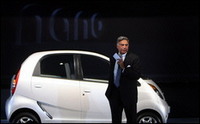Ultra Low Cost Nano Carries Big Burden For India's Tata Motors
SANAND, India March 18, 2009; Analysis by Rina Chandran writing for Reuters. reported "What a difference a year makes."
In early 2008, Tata Motors unveiled its Nano to a rapturous media reception as the snub-nosed, 4-seater with a 100,000-rupee ($1,945) price tag created a new category of super-cheap cars for the masses.
Just weeks later, Tata Motors acquired the Jaguar and Land Rover brands for $2.3 billion from Ford Motor Co in a blaze of glory, and the company reveled in the global spotlight.
But Tata, India's top vehicle maker, next week rolls out the Nano six months behind schedule, amid worries that an economic downturn and production constraints may spoil the success of the world's cheapest car.
Since the Nano was first shown, the main production plant had to be moved following land protests, Tata Motors posted a first loss in seven years as sales slumped, and its shares have dropped 75 percent. On top of that, Tata Motors' credit rating was downgraded as its debt-fueled expansion binge left it exposed to the financial crisis.
"In the last 12 months, Tata has been hit by a perfect storm," said Ashvin Chotai, managing director at consultancy Intelligence Automotive Asia in London.
"At the time, it was unimaginable that the venerable Tata would have difficulty tapping credit markets. But its resources became stretched from venturing out on so many fronts, and the slump in sales and tighter credit worsened the situation."
A bridge loan of $2 billion is due in June, with Standard & Poors warning of another ratings downgrade because of the "extremely adverse" operating environment for Jaguar/Land Rover, Tata's ambitious capex plans and deteriorating cash flow.
The high fuel and commodity costs that made the Nano imperative a year ago have faded somewhat, but its place in the history books is still secure, with a popular following that could rival the Beetle, Mini and Fiat 500, analysts say.
"The Nano will still create a new segment, bridging the gap between motorbikes and entry-level cars, and it will still be the first of its kind," said Mohit Arora, a director at JD Power Asia-Pacific in Singapore. "Those fundamentals haven't changed."
PATCHY RECORD
The Nano goes on sale in April, the start of the new fiscal year. Only about 50,000 cars will be available in the first year from Tata's facilities in Pune and Pantnagar, analysts say, until the 250,000-unit capacity in Gujarat comes onstream.
The delays added to the $350 million Tata had already invested in the project, and also meant the company, best known for its buses and trucks, has squandered some of its first-mover advantage in what looks to be a fiercely competitive segment.
"Tata has lost some momentum because of the delays, and competition may have put it to use," said Deepesh Rathore, managing director, India of UK-based consultancy Global Insight.
"But, on the positive side, interest rates on vehicle loans have come down a bit and material costs have also come down, so that's two things they don't have to worry about."
Oil is below $45 a barrel, after having topped $100 at the time of Nano's unveiling, while steel prices have more than halved since mid-2008. Combined with lower interest rates, vehicle sales in India had their best month in four months in February.
But consumer sentiment remains muted.
Tata has tied up with several state-run banks for easy terms, including loans of up to 85 percent of the price, but even that may not bolster sentiment, said Pradeep Saxena, senior vice president at TNS Automotive.
"Consumers are postponing purchases, and this segment of first-time buyers is very sensitive to finance terms," he said.
Analysts say Tata will most likely raise the price soon, particularly on deluxe models, but the slim margins, the initial capacity constraints and the depressed market sentiment mean that breakeven on the Nano project will take 5-6 years.
Meanwhile, the venture of Renault/Nissan Motor with Bajaj said their $2,500 car is on track to launch in 2011, while Maruti Suzuki and Hyundai Motor, the No.1 and No.2 carmakers in India, are unlikely to cede ground to the Nano without a fight.
Volkswagen, Toyota Motor, Honda and Fiat have also said they were keen to build low-cost cars, although the slowdown may temper their investment plans.
The slowdown makes it harder for Tata to boost commercial vehicle sales, its mainstay, and to refinance the $2 billion bridge loan. But the gloomy economic scenario may also suit Tata Motors to some degree.
"Given how everyone's talking about being frugal, it may be considered cool to be seen in a Nano," said Hormazd Sorabjee, editor of Autocar magazine.
Thousands of supporters on Facebook clearly think so, with groups that want the car in Denmark, Chile, South Africa, Argentina, Italy, France and the United States. The website (www.tatanano.com) has received more than 40 million hits.
"I heard there's a big rush for applications for the car. I just hope we can get one. I've waited for so long," said Shweta Kumari, who wants a car so she doesn't have to share one.
Editing for Reuters by Lincoln Feast



